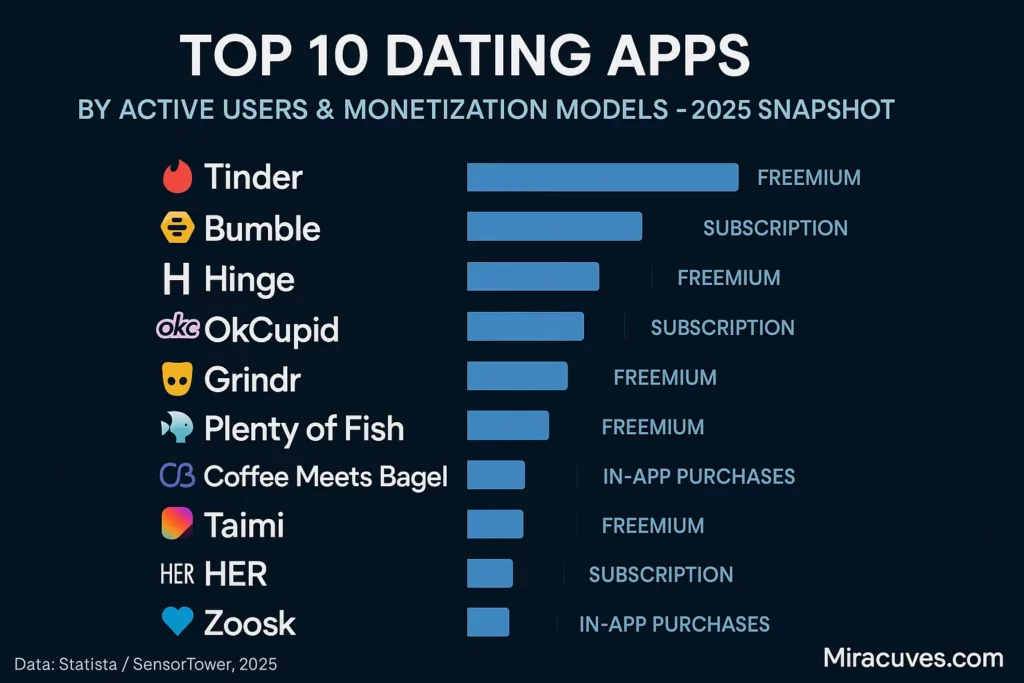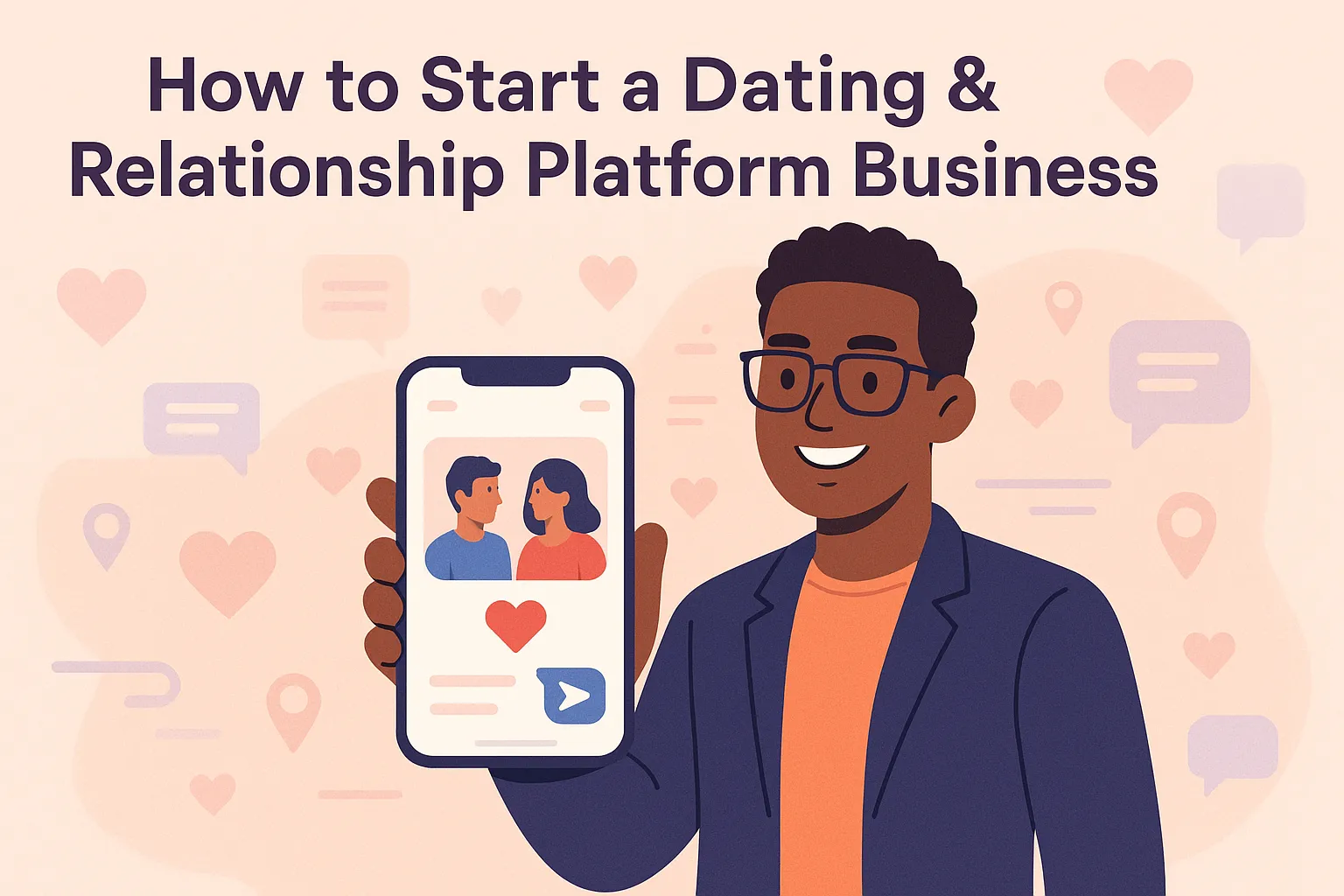Remember when people met “the one” at college, the office, or that friend-of-a-friend party? Fast forward to now — love’s got a new wingman: dating apps. From swiping right on Tinder to video chats on Bumble, romance is just a tap away. And honestly? Users love it. With everyone living half their lives online, finding love there just makes sense.
If you’re an entrepreneur eyeing a thriving niche, this is a goldmine. Online dating is more than just cute bios and awkward first dates. It’s a tech-powered ecosystem combining AI, geolocation, personalization, and seriously smart user funnels. Whether you want to create the next Tinder or a niche app for dog lovers in Detroit — now’s your chance.
Here’s where it gets juicy: building a dating app from scratch is intense. But launching a Tinder clone or custom dating platform with a trusted tech partner? That’s the smart shortcut. At Miracuves, we help startups and dreamers go live with high-performance, scalable relationship platforms—without the headache.
What Today’s Top Dating Apps Get Right — and What You Can Learn
Dating apps are like flavors of ice cream — everyone’s got a type. Let’s break down some of the frontrunners:
- Tinder – The swipe that started it all. Geolocation-based, minimal bio, max visual appeal. Mass market.
- Bumble – Women make the first move. Empowerment meets dating. A clear example of brand-led UX.
- Hinge – “Designed to be deleted.” Prioritizes compatibility and deeper profiles.
- OkCupid – Data-driven with detailed questionnaires. More thoughtful matches.
- Grindr – The pioneer in LGBTQ+ dating apps, optimized for location and quick connections.
- Coffee Meets Bagel – Curated matches daily; less swiping, more substance.
- Taimi, HER, Plenty of Fish, Zoosk – Each with unique spins targeting niches or features.

- The global online dating market is projected to hit $13.7 billion by 2030.
- Over 366 million people use dating apps globally.
- Pandemic habits stuck: virtual dating, video calls, app-first intimacy.
Users want hyper-personalized experiences, privacy assurance, and faster matches. Entrepreneurs want apps that are ready-to-go but customizable.
Read more: – What is Tinder App and How Does It Work?
Key Features Your Dating Platform MUST Have
Let’s keep it real — if your app doesn’t “feel” intuitive, users will bounce faster than a ghosted text. Here’s what to bake in:
User Onboarding & Safety
- Email/Phone verification
- Photo ID validation
- Report & block features
Media Suggestion: UX illustration of a safe onboarding flow
Smart Matching Algorithms
- Filters by age, distance, interests
- AI-powered compatibility scores
Messaging & Engagement Tools
- In-app chat, voice/video calling
- Ice-breakers, GIFs, prompts
Geolocation & Discovery
- Show nearby users
- Travel modes for city-hoppers
Monetization-Ready Options
- Freemium with in-app purchases
- Subscription tiers: Basic, Plus, Premium
- Boosts, Super Likes, Spotlight
Launching Your Own: Clone vs Custom Build
You have two routes:
- Start from Scratch – Long timeline, higher cost, but absolute control.
- Use a Clone Script – Quicker, cheaper, scalable. Tailor it to your niche.
Why Clones Make Business Sense:
- Faster Time-to-Market – Go live in weeks, not months.
- Battle-Tested UX – Mimics what users already know.
- Lower Risk – You build on proven product logic.
Example: A Bumble clone lets you retain the “women-first” feature but add cultural tweaks for your region.
Read more: –What is Cameo App and How Does It Work?
Real-World Use Cases
- Elite Matchmaking Startup in NYC – Used a Hinge-style clone with AI matching for professionals aged 30–45.
- Muslim Matrimonial App – Customized with family approval features, religious filters, and gender-sensitive UX.
- Rural Dating in Europe – Focused on hyper-local communities, offline meetups, and language localization.
Your Dating App’s Engine Room: Tools, Timeline & Tech Choices That Matter
Here’s what building a dating app typically involves:
- Frontend: React Native or Flutter for Android/iOS
- Backend: Node.js or Laravel with PostgreSQL/MongoDB
- AI/ML: TensorFlow or OpenAI for matchmaking
- Hosting: AWS/GCP with real-time push
What’s Next for Dating Apps?
- AR-powered Dates
- Voice-first Dating (like Clubhouse meets Hinge)
- NFT Avatars & Dating in the Metaverse
- Hyperlocal “drop pin” Dating
The market isn’t saturated — it’s maturing. And niches are exploding.
Read more: – What is Bumble App and How Does It Work?
Conclusion
Dating apps have evolved far beyond match-making. They’re digital relationship engines, engineered to drive engagement, boost retention, and create entire subcultures. Whether you’re building for digital nomads, Gen Z introverts, or salsa-dancing dog lovers — the opportunity is wide open.
At Miracuves, we partner with visionaries to launch lightning-fast, profit-ready dating app clones that are smart, secure, and uniquely yours. Got a bold idea? Let’s bring it to life — together.
FAQs
Q1. What’s the best monetization model for a dating app?
Freemium + subscriptions work best. Add-ons like boosts and profile visibility upgrades are great revenue drivers.
Q2. How much does it cost to launch a dating app?
You can launch a fully functional dating app with Miracuves for $2K to $5K using a ready-made clone solution, delivered within 3–6 days including complete setup and deployment.
Q3. Can I make a niche dating app using a Tinder clone?
Absolutely! Clone scripts are customizable — you can tweak the UX, features, branding, and matching logic.
Q4. Is it safe to launch a dating app with clone technology?
Yes. Miracuves ensures security, scalability, and GDPR compliance in every deployment.
Q5. How long does it take to launch?
With a ready clone base, you can go live in 3–5 weeks after design and feature integration.
Q6. What support does Miracuves provide post-launch?
Ongoing maintenance, feature updates, performance scaling, and 24/7 tech support are included in our packages.
Related Articals:








